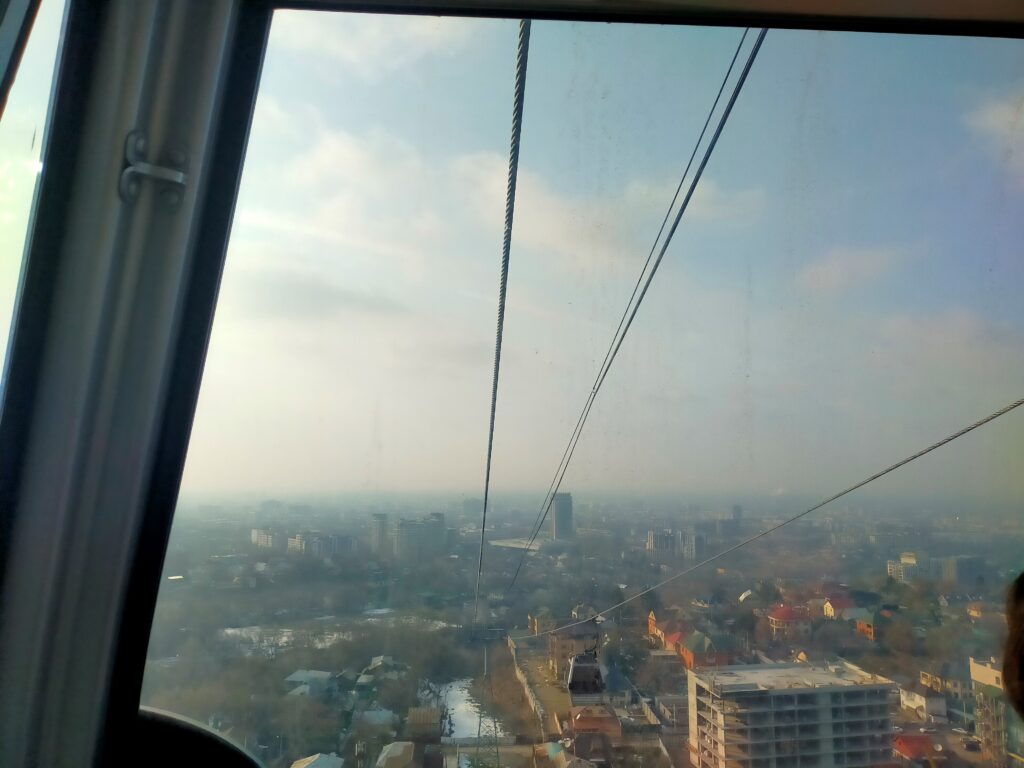Overseas Language Training Russian C Repor
School of Comprehensive Studies, Study Group 1
Shinkawa Asahi (1st year)
“Motivation for participating in the training”, “Consideration on the Republic of Kazakhstan”, “Changes and growth before and after the training”
- Motivation for participating in the training
I think that the strength of the School of Comprehensive Studies, to which I belong, is that students will be able to have an interdisciplinary perspective by coming into contact with a wide range of academic fields, regardless of whether they are in the humanities or sciences. Therefore, the main reason is that I thought it was more important than anything else to actively participate in things that I had never experienced before or that I had never tried before. I also wanted to see how well the Russian I had studied for a year would actually work with people living in Russian-speaking countries, and I was interested in the culture and climate of Central Asia, which was my motivation for participating in this language training program.
- Consideration on the Republic of Kazakhstan
・ Attractiveness
I have spent just over a month in Almaty so far, and in that short time I have been helped many times by complete strangers. When I got lost and my smartphone had run out of battery, I was in a difficult position and didn’t know what to do, but a student passing by spoke to me.
I felt that the imbalance between Almaty’s level of economic development and the strength of its local community ties was what attracted me to this city.
・Air Pollution
The air quality in Almaty is terrible. When I visited the observation deck called Koktobe (Figures 1 and 2) in the southeast of Almaty in mid-March, I couldn’t see anything because the city was swallowed up by gas due to air pollution.
The reasons for this air pollution include people buying a lot of low-priced used cars and frequent traffic jams. Also, if you look at the topography, you can see that the wind is very weak and the air stagnates because it is surrounded by mountains, and because it is located near the mountains, the altitude is about 800 meters, which causes incomplete combustion of gasoline in the car. Topographically, it may be similar to a city like Mexico City.
 【Figure 1 Koktobe Observation Deck】
【Figure 1 Koktobe Observation Deck】
 【Figure 2 Almaty as seen from the gondola】
【Figure 2 Almaty as seen from the gondola】
・Umbrella
I noticed that people in Kazakhstan rarely use umbrellas, even when it is snowing or raining. So I asked my Kazakh friends, “Why don’t you use umbrellas?” and they replied, “It’s too much hassle to use an umbrella.” I once heard that people in England don’t use umbrellas. This is probably due to the rapid change in weather. I am not familiar with geography or weather, but I imagine the weather in Kazakhstan (or at least Almaty) is as changeable as it is in the UK.
・Character
The people of Kazakhstan seemed to live freely, taking things at a leisurely pace and blurring boundaries. It’s possible that I just don’t know much about countries other than Kazakhstan, and that Japan may actually be too tight compared to other countries in the world, but I felt that the people of Kazakhstan are not demanding too much efficiency.
I was surprised when I heard that all the Kazakh people were late for the meeting. In early March, we made plans to go to the bazaar with some students from Kazakh National University and set the meeting time at 2 p.m., but when the time came, only one student from Kazakh National University had arrived. One of the people who came said, “I came early because I know that Japanese people are strict about time.” I had heard before that it was normal to be late for a party at home, but I had no idea that people were late for all meeting times, except for those at home. This tardiness seems like some kind of etiquette. In this way, I thought that people who grew up in a culture where they were expected to be loose with their time would become easy-going and relaxed.
- Changes and growth before and after the training
In the past, whenever I tried to tackle something, I would often only set a clear path to success before taking action. In fact, I think that worked for most things well until I was in high school. However, once I became a university student and was required to tackle academic subjects where the answers might not even be clear, rather than problems with clear answers like in entrance exam studies, I became concerned about the uncertainty of the path to the answer and was no longer able to take proactive action. Therefore, during this language training program, I tried to act first, rather than thinking this or that in my head. f there was a restaurant in town I wanted to try, I would just go in without worrying about my language ability, and I would proactively communicate with my Russian teacher, and I took on various challenges. Now that a month has passed since I came to Almaty, I feel that I have become more confident in my actions compared to before the training. Of course, not all attempts were successful; there was a time when I had no idea what the waiter was saying in a restaurant. However, I realized that there were many lessons I could have learned from those failures. I believe these experiences will be a great asset to me.



